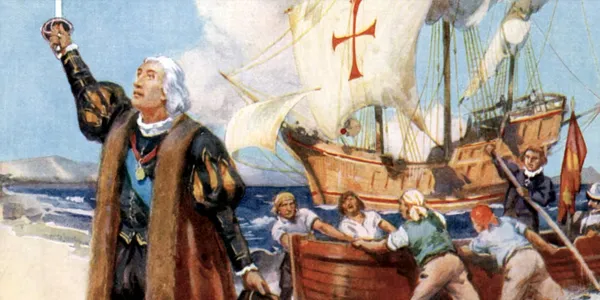⚓How Much Do You Know About The Age Of Exploration?🚢
2. In what year did Christopher Columbus first sail to the Americas?

In 1492, Columbus sailed under the Spanish crown and reached the Caribbean, marking the beginning of European exploration and colonization in the New World.
What led to the Age of Exploration? Several factors propelled Europeans to explore:
Asian spices were invaluable, but transporting them by land was long and dangerous. Maritime trade was faster and more profitable.
Advances in technology, such as the compass, astrolabe, and caravel (a fast and agile ship), made long-distance voyages possible.
Religious dissemination, with missionaries dedicated to spreading Christianity.
National competition, with European kingdoms like Spain and Portugal eager to surpass each other in wealth and prestige. These motivations combined to usher in the global Age of Discovery.
Famous Explorers Who Changed the World
Christopher Columbus (1451-1506)
In 1492, Columbus set sail under the Spanish flag in an attempt to find a westward route to Asia. He ultimately reached the Caribbean, opening the Americas to European exploration. Although controversial today, his voyage marked a turning point in world history.
Vasco da Gama (1460-1524)
In 1498, this Portuguese explorer became the first European to reach India by sea. His voyage opened a sea route that transformed global trade and solidified Portugal's position as a maritime power.
Ferdinand Magellan (1480-1521)
Magellan's expedition was the first to circumnavigate the globe, proving the roundness of the Earth and the vastness of its oceans. Although Magellan died in the Philippines, his crew completed this historic voyage. Hernán Cortés (1485-1547) and Francisco Pizarro (1471-1541) led the Spanish conquests of the Aztec and Inca empires, respectively. Their actions reshaped the Americas, often with devastating consequences for the native inhabitants.
John Cabot, Henry Hudson, and others
Northern explorers sought the elusive Northwest Passage to Asia. Although they ultimately failed, they mapped the coastline and laid the foundation for future colonization.
The Impact of Exploration
The Columbian Exchange
The meeting of the Old and New Worlds sparked an exchange of plants, animals, and ideas. Potatoes, tomatoes, and corn arrived in Europe, while horses, wheat, and coffee arrived in the Americas. This exchange reshaped people's diets, economies, and lifestyles.
Global Trade
Exploration fostered the development of empires and trade networks. European nations established colonies, bringing immense wealth but also, at times, large-scale exploitation.
Cultural Clashes
The explorers' encounters with diverse peoples often fostered both cooperation and conflict. Unfortunately, disease, war, and colonization also brought tragedy to many indigenous communities.
Science and Knowledge
Maps became more accurate, navigation techniques improved, and Europeans' worldviews expanded dramatically. This spirit of exploration fueled the Scientific Revolution.
Life on Exploration Ships
Exploration wasn't all glory; it was also full of hardships. Sailors endured crowded conditions, limited food (primarily cured meat and hard biscuits), and diseases like scurvy. Many voyages ended in mutiny or disaster. However, the promise of wealth and adventure inspired brave sailors to explore the unknown.
The Legacy of the Age of Exploration
The Age of Exploration laid the foundation for our modern, globalized world. It was a time of courage, innovation, and ambition, but also of conquest and cultural conflict. Understanding this era helps us understand how history has shaped today's interconnected society.
Now that you've embarked on this historical journey, it's time to test your knowledge! Take our fun Age of Exploration quiz below to see if you're a true master of historical navigation.
